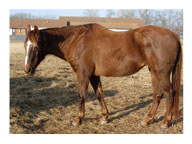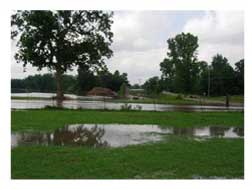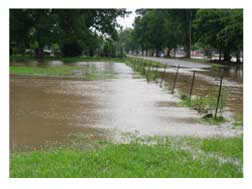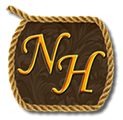In Loving Memory

Juniper Moon Wind
Affectionately Known As Iggette
April 6, 1977 To March 20, 2008
She Was An Outstanding Horse For Many Years
She Will Be Greatly Missed
By All Who She Taught to Ride
& By Those Who She Helped Overcome Their Fears

 June 15, my trainer & I were standing in the lot by the barn watching the water rise from the creek just south of us. It was slow but relentless. The front lot had small ruts made by my car from the night before as I packed all of my leather goods from the tack room. With each hour, the grass slipped out of sight. The ruts disappeared under a small rush of water that eventually became a small stream in itself. This stream split in two with one half snaking its’ way to the arena and the other half making a straight march for the barn & back pasture. The back pond soon had all of the back pasture consumed except for 2 small rises on which 2 horses were standing. The 5 acre south pasture was becoming a small lake as the creek rose higher. The horses there kept grazing just in front of the moving water line. At 2:00pm, the creek finally crested and the worst of the damage was over. The water had managed to enter the barn and only flooded 2 stalls. We never had to make the decision to move the horses, but there was a plan if needed.
June 15, my trainer & I were standing in the lot by the barn watching the water rise from the creek just south of us. It was slow but relentless. The front lot had small ruts made by my car from the night before as I packed all of my leather goods from the tack room. With each hour, the grass slipped out of sight. The ruts disappeared under a small rush of water that eventually became a small stream in itself. This stream split in two with one half snaking its’ way to the arena and the other half making a straight march for the barn & back pasture. The back pond soon had all of the back pasture consumed except for 2 small rises on which 2 horses were standing. The 5 acre south pasture was becoming a small lake as the creek rose higher. The horses there kept grazing just in front of the moving water line. At 2:00pm, the creek finally crested and the worst of the damage was over. The water had managed to enter the barn and only flooded 2 stalls. We never had to make the decision to move the horses, but there was a plan if needed. this is not a question that the ordinary person would normally ask. After all, if you have never experienced a flood, who really thinks of it until the water is rising on your property. The first time it flooded, I was called at work to come help move the horses to the town’s fairgrounds. My husband & I helped move 22 horses & 3 tack rooms in less than 3 hours. We made 3 trips with my 2-horse trailer from the barn to the fairgrounds. Since my late trainer was well known in the area, friends came with other horses trailers, trucks or just time to baby-sit at the fairgrounds while the rest of us made mad dashes back & forth. The horses stayed at the fairgounds for 4 days. We cleaned up the barn, removed all shavings and spread lime on still wet floors. Then it was time to move back.
this is not a question that the ordinary person would normally ask. After all, if you have never experienced a flood, who really thinks of it until the water is rising on your property. The first time it flooded, I was called at work to come help move the horses to the town’s fairgrounds. My husband & I helped move 22 horses & 3 tack rooms in less than 3 hours. We made 3 trips with my 2-horse trailer from the barn to the fairgrounds. Since my late trainer was well known in the area, friends came with other horses trailers, trucks or just time to baby-sit at the fairgrounds while the rest of us made mad dashes back & forth. The horses stayed at the fairgounds for 4 days. We cleaned up the barn, removed all shavings and spread lime on still wet floors. Then it was time to move back.
